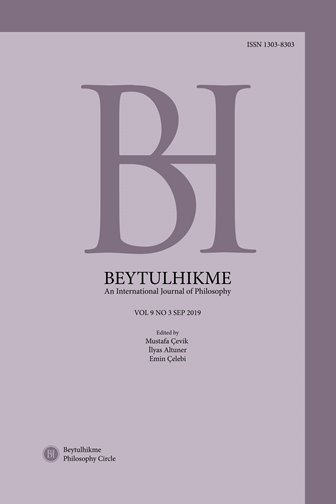İbn Rüşd’ün Telhîsu’l-Makûlât’ta, Farabi’nin ‘Küllî ve Şahıs Araz’ Tahliline Dair Eleştirisi ya da Ontolojik ve Epistemik Cevher Üzerine
Author :
Abstract
Aristoteles’in Kategoriler adındaki ünlü eserinde, yalnızca mantık açısından değil aynı zamanda metafizik açısından da son derece önemli ve kritik bir bölüm (1a20-1b25) mevcuttur. Var-olanların, dörtlü bir tasnife tabi tutulduğu bu bölüm içinde, cevher ve arazların mahiyetine ve küllî ile cüzînin ne olduğuna dair temel bir bakış açısı sunulmaktadır. Aristoteles’in, ‘bir konuda’ olmak ve ‘bir konu hakkında’ söylenmek üzerinden yaptığı bu tasnifin en kritik noktası, hangi tür yüklemlerin, kendi mahiyet ve anlamını yüklendiği konusuna zorunlu olarak aktardığının tespitidir. Bu hususta, Aristoteles’in metninin kısalığı ve verdiği örneklerin mahdut oluşu nedeniyle, antik çağdan itibaren farklı yorumlar zuhur etmiştir. İbn Rüşd, özelikle ‘tanım teorisi’ bakımından oldukça önemli olan, arazların, yüklendikleri cevherler hakkında verdikleri bilginin mahiyeti meselesinde ortaya çıkan farklı yorumları kritik etmektedir. Özellikle Fârâbî’nin bu mesele hakkındaki çözümünün, antik şarihlerin genel yorumundan –haklı olarak- ayrıldığını tespit eden İbn Rüşd, daha sonra İbn Sînâ’nın yorumunu da göz önüne alarak, Fârâbî’nin çözümünü de eleştirmekte ve kendince en sağlıklı çözüme ulaşmaktadır.
Keywords
Abstract
In Aristotle's famous work titled Categories, there is an important and critical chapter (1a20-1b25), not only in terms of logic but also in metaphysics. This section, in which the existing ones classified into a quaternary classification, a basic perspective on the nature of ore and symptoms and what is total and less is presented. The most critical point of this classification which Aristotle made on ‘being on a subject’ and being told ‘about a subject’, is the determination of which kinds of predicates are obliged to convey to his subject matter and meaning. In this regard, because of the shortness of Aristotle's text and the limited examples are given, different interpretations have emerged since ancient times. Ibn Rushd criticizes the different interpretations of the nature of the information they give about the ores they are loaded, which are very important especially in terms of ‘definition theory’. Ibn Rushd, who found that the solution of Fârâbî on this matter, rightly left the general interpretation of the ancient Sharia, especially criticized the solution of Fârâbî by considering the interpretation of Ibn Sina and reached the most healthy solution in his way.
Keywords
- Cavarero, A. (2017). Platona Rağmen: Antik Felsefenin Feminist Bir Yeniden Yazımı. (Çev. B. Tanrısever). İstanbul: Otonom Yayıncılık.
- Er, S. E. (2015). Wittgenstein’ı Rorty ve Irigaray ile Okumak. Beytulhikme An International Journal of Philosophy, 5 (2), 169-189.
- Hafız, M. (2017). Anne ve Felsefe: Bastırılmış Dişilin Felsefe Tarihindeki İçkin Rolü Üzerine. Kaygı, 29, 173-180.
- Irigaray, L. (1985). This Sex Which is Not One. (Trans. C. Porter). Ithaca: Cornell University Press.
- Irigaray, L. (1987). Speculum of the Other Woman. (Trans. G. G. Gill). New York: Cornell University Press.
- Irigaray, L. (2002). Between East and West. (Trans. S. Pluháček). Ne York: Colum- bia University Press.
- Irigaray, L. (2006). Ben Sen Biz: Farklılık Kültürüne Doğru. (Çev. S. Büyükdüvenci & N. Tutal). Ankara: İmge Kitabevi.
- Irigaray, L. (2011). Nietzsche’nin Deniz Aşığı. (Çev. İ. Yerguz). İstanbul: Kabalcı Yayınevi.
- Irigaray, L. (2012). Meryem’in Esrarı. (Çev. F. Yıldırım). İstanbul: Pinhan Yayıncı- lık.
- Irigaray, L. (2014). Başlangıçta Kadın Vardı. (Çev. İ. Özallı & M Odabaş). İstanbul: Pinhan Yayıncılık.
- Irigaray, L. (2016). Büyücü Aşk: Platon’un Sempozyum’undan Diotima’nın Ko- nuşmasına Dair Bir Okuma. (Çev. O. Varolun & F. B. Tatlı). Özne, 24.
- Keping, G. U. (2019). The Female Sex: Irigaray’s Critique of Freud and Plato. Comparative Literature: East & West, 11 (1), 44-56.
- Lacan, J. (2017). Babanın Adları. (Çev. M. Erşen). İstanbul: Monokl Yayınları.
- Molacı, M. (2016). Irigaray’ın Mağarası: Aynı Erkek, Ayna Kadın. Özne, 24.
- Stone, A. (2016). Feminist Felsefeye Giriş. (Çev. Y. Cingöz & B. Tanrısever). İstan- bul: Otonom Yayıncılık.
- Winterson, J. (2018). Vişnenin Cinsiyeti. (Çev. P. Kür). İstanbul: Sel Yayıncılık. Öz: Luce Irigaray’ın çalışmaları psikanaliz ile yakından ilişkilidir. Batı felsefesinin eril yapısını tahrip etmede psikanalizden oldukça faydalanır. Öte yandan Freud ve Lacan’a yönelik eleştirileri de bir hayli dikkat çekicidir. Çünkü Irigaray’a göre gerek Freud gerekse de Lacan eril dil ve gramer içerisinde iş gören birer düşünürdürler. Bu bağlamda bu çalışmada Irigaray’ın psikanaliz ile olan ilişkisi çerçevesinde Batı felsefesine yapmış olduğu bazı eleştiriler ele alınacaktır. Bu eleştireler dâhilinde Irigaraycı dişil bir öznelliğin ve dilin imkânı soruşturulacak ve bu imkân dâhilinde Irigaray’ın Platon’un mağara mitine yönelttiği eleştiriler üzerinden “Anne-Kız” ilişkisi serimlenmeye çalışılacaktır. Anahtar Kelimeler: Eril, dişil, psikanaliz, feminizm, Platon, öznellik, dil.
- [*] Bu çalışma, 2019 yılında Fatime Gümüş tarafından Çukurova Üniversitesi Sosyal Bilimler
